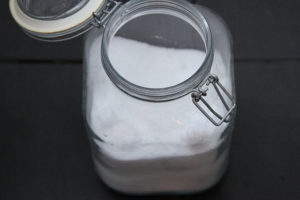8 Gout Home Remedies… But Only 1 Works Well

Gout is a form of arthritis, which results from uric acid crystallization in the joints.
Jump Ahead to the Best Remedies
Your first indication that you may be suffering from gout is experiencing painful joints – especially in your big toe, your ankle, and your knee. Many people turn to home remedies to treat gout before contacting their doctor, as there’s evidence that many household staples can be used to treat gout. Several home remedies have been found to have varying degrees of success in the treatment of gout. They include:
- Apple Cider Vinegar
- Ginger Root
- Baking Soda
- Lemon Juice
- Epsom Salt
- Cherries
- Bananas
- Lab Grade Chanca Piedra
You likely already have most of these items in your kitchen at home. So, which remedies work and which do not work? You’ve come to the right place to find out. We’ve tested each method and have summarized our findings below.
Why Do I Suffer from Gout?
One word: hyperuricemia. Or, in other words, increased uric acid in your blood. This is the reason why your joints are painful and inflamed. Uric acid is a normal product in your body – it is a substance that breaks down purines in your body which are found in certain foods that we eat, in addition to being found in human cells. When your body overproduces uric acid, you’re at risk for developing gout. But, why would your body overproduce uric acid?
The triggers of hyperuricemia include:
- Injury
- Infections
- Surgery
- Diuretics
- Chemotherapy
- Crash diets
- Excessive alcohol consumption (especially beer)
- Eating large amounts of red meat and shellfish
- Dehydration
- Drinking sugary sodas
It is these types of triggers that can create the hyperuricemia, which can result in gout. When you overproduce uric acid, your kidneys have to work harder to flush out the extra uric acid out of your bloodstream, as they would normally do.
What are the Symptoms of Gout?
If you think you are suffering from gout, how can you be sure? One of the tell-tale signs of gout is excruciating swelling and pain in the big toe, usually resultant of an injury. Gout may affect other joints intermittently, though, most often it affects the joints in the foot and knee. If left untreated, gout can become a chronic condition.
If you do not treat gout symptoms, your body may produce something called “tophi” – which are little crystals that form disfiguring lumps near your joints and can also produce painful kidney stones.
Home Remedies for Gout
Because of the rise in health care costs and the popular inclination to try natural home remedies to prevent the need for prescription drugs and surgeries, many people are turning toward alternative remedies to treat gout. A number of these “home remedies” have been acknowledged for treating gout. But, are they effective or not? We will present a number of them below and discuss their likelihood of success.
1. Apple Cider Vinegar
Apple cider vinegar is used to treat gout because its acidity relieves the acute pain associated with gout and other types of arthritis. The vinegar increases the body’s alkalinity and has anti-inflammatory properties. Some individuals also add honey to the apple cider vinegar because of honey’s anti-inflammatory properties.
The bad news is that you take the concoction by the spoonful, and apple cider vinegar isn’t exactly known for it’s amazing taste. To be most effective, you need to take up to two tablespoons of apple cider vinegar three times a day. Scientific results are lacking in evidence that apple cider vinegar really works. There was a study in Japan in 2010 which looked at different diets to improve alkalization of urine to increase the removal of uric acid from the body. Apple cider vinegar was in one of the diets, but was not tested alone.
Be careful: the high acidity of apple cider vinegar can erode esophagus tissue and tooth enamel. In addition, it might have a negative interaction with certain blood pressure and diabetes medications.
Success stories are hit or miss with apple cider vinegar and the treatment of gout. We give it two stars.
2. Ginger Root
Ginger root is known for its anti-inflammatory properties. It’s been found to be mildly effective in easing the pain associated with inflamed joints. When treating gout with ginger root, individuals can use ginger root in recipes and/or mix ginger root with warm or boiling water and drink as a tea. Ginger root can also be used topically as a paste to relieve pain associated with gout.
As with vinegar, success stories are hit or miss. We also give ginger root two stars.
3. Baking Soda
Similar to apple cider vinegar, baking soda increases your body’s alkalinity. Users take baking soda to relieve gout pain by dissolving ½ teaspoon of baking soda in water and drinking multiple glasses per day. Baking soda lowers the amount of uric acid in the body, which leads to pain relief. The reports of baking soda and its effect on gout are slim, though the recommended dose for treatment is up to 4 teaspoons per day. If you suffer from high blood pressure and/or monitor your salt intake, you should consult with a doctor first before trying this treatment method.
Because of the potential negative effects high consumption of baking soda can have on the body, we give it two stars.
4. Lemon Juice
Lemon juice is often combined with baking soda in the treatment of gout to neutralize the excess uric acid in the body. The lemon juice and baking soda work together alkanize the body. Most individuals who attempt this method will mix the lemon juice directly with the baking soda. After it stops fizzing, drink the mixture right away. Ingesting this combo multiple times throughout the day helps to minimize gout pain. The vitamin C in the lemon juice is also thought to help with gout pain and reduce inflammation.
Lemon juice has been found to be somewhat effective in the treatment of gout, though more evidence is needed. We give it two stars.
5. Epsom Salt
Epsom salt is used regularly by those who suffer from arthritis and gout. The Epsom salt is high in magnesium and is used to relax muscles. Mix Epsom salt with bath water and soak to relieve the aches and pains associated with gout and other forms of arthritis. Some tout Epsom salt as one of the most effective topical treatments for gout. It works by repairing the alkalinity in the body. Soak in an Epsom salt bath for 30 minutes for maximum pain relief.
Epsom salt has been widely used for the treatment of gout, but we could not find any scientific research to support its usage. We give it two stars.
6. Cherries
The high antioxidant properties in cherries reduce uric acid buildup and relieve associated gout pain. In fact, several studies have shown the effectiveness of cherries in the treatment of gout. When participants ate 10-12 cherries (fresh fruit is better than fruit extract) up to 3 times per day, gout attacks decreased by 35%. Be warned though, cherries contain a high amount of sugar, offsetting the beneficial properties of this home remedy for diabetic patients with gout.
In addition, increased alcohol or purine ingestion decreased the benefits seen with cherry consumption. On the other hand, when eaten in conjunction with taking allopurinol or colchicine, the benefits were increased.
Cherries do have more research evidence than other natural home remedies in the treatment of gout. We keep it at two stars though because of the high sugar content consumed to maximize gout pain relief.
7. Bananas
Eating one or two bananas daily is believed to treat gout symptoms because bananas are high in potassium which prevents uric acid crystals from forming in the body. Additionally, if uric acid crystals have already formed in the body, the potassium will prevent them from solidifying so that they are more easily flushed out of the body by the kidneys.
Overall evidence is hit or miss with bananas. We give it two stars.
8. Lab Grade Chanca Piedra
An all-natural herb, lab grade Chanca Piedra is a known uric acid inhibitor. This plant blocks uric acid production in the body, eliminating the occurrence of a gout attack. While most people would prefer treating their gout condition with a home remedy such as the ones listed above, the problem is that most of these home remedies do not have solid scientific evidence that they work. One natural home remedy that has shown positive results time and again is lab grade Chanca Piedra.
Long used as a natural treatment for kidney and gall stones, Chanca Piedra actually means “stone crusher.” This weed-like plant reduces the occurrence of gout in the body by breaking down and flushing out crystallized uric acid crystal buildup. Because of its proven effectiveness in the treatment of kidney stones, gall stones, and uric acid inhibition, we given lab grade Chanca Piedra five stars.
What’s the Best Way to Take Lab-Grade Chanca Piedra for the Treatment of Gout?
Your body doesn’t typically excrete enough uric acid on its own to minimize the risk of a gout attack. Lab-grade Chanca Piedra is that extra added push for your body to be able to not only flush out uric acid in the kidney and liver, but to also inhibit the formation of uric acid crystals. Chanca Piedra has also been shown to help with inflammation.
To dissolve uric acid crystals or to prevent them from forming altogether:
- Take 400mg of lab grade chanca piedra when you wake.
- Wait one hour before eating to ensure maximum uptake of the herb.
- Take 400mg of lab grade chanca piedra at night.
- Once your gout attacks are under control, scale back to just 400mg per day.
Keep in mind that each individual is unique and will respond differently to each treatment type. Always discuss any new treatments that you are considering with your physician prior to starting them so he/she can review with you any potential medication interactions and potential side effect concerns.












